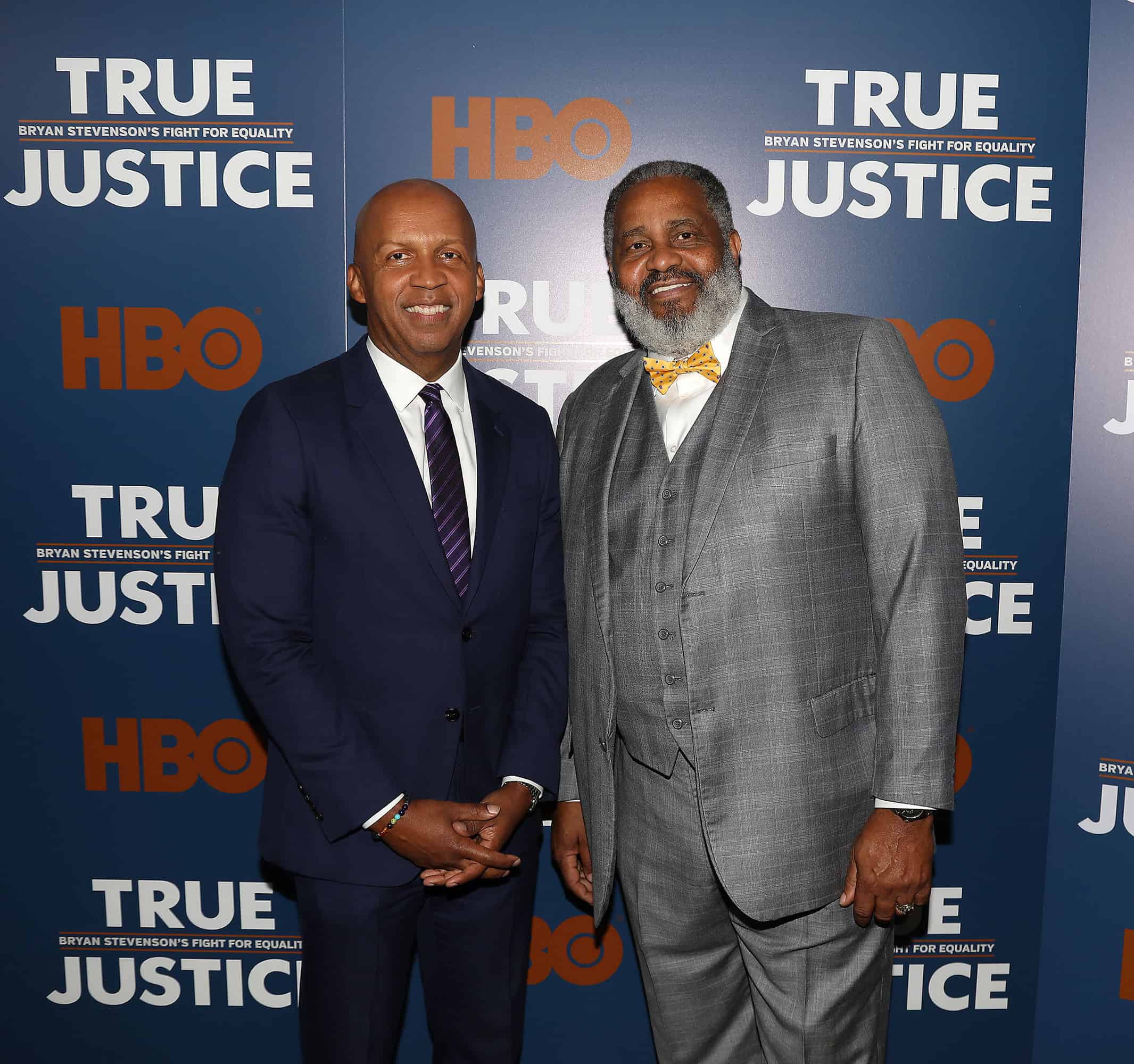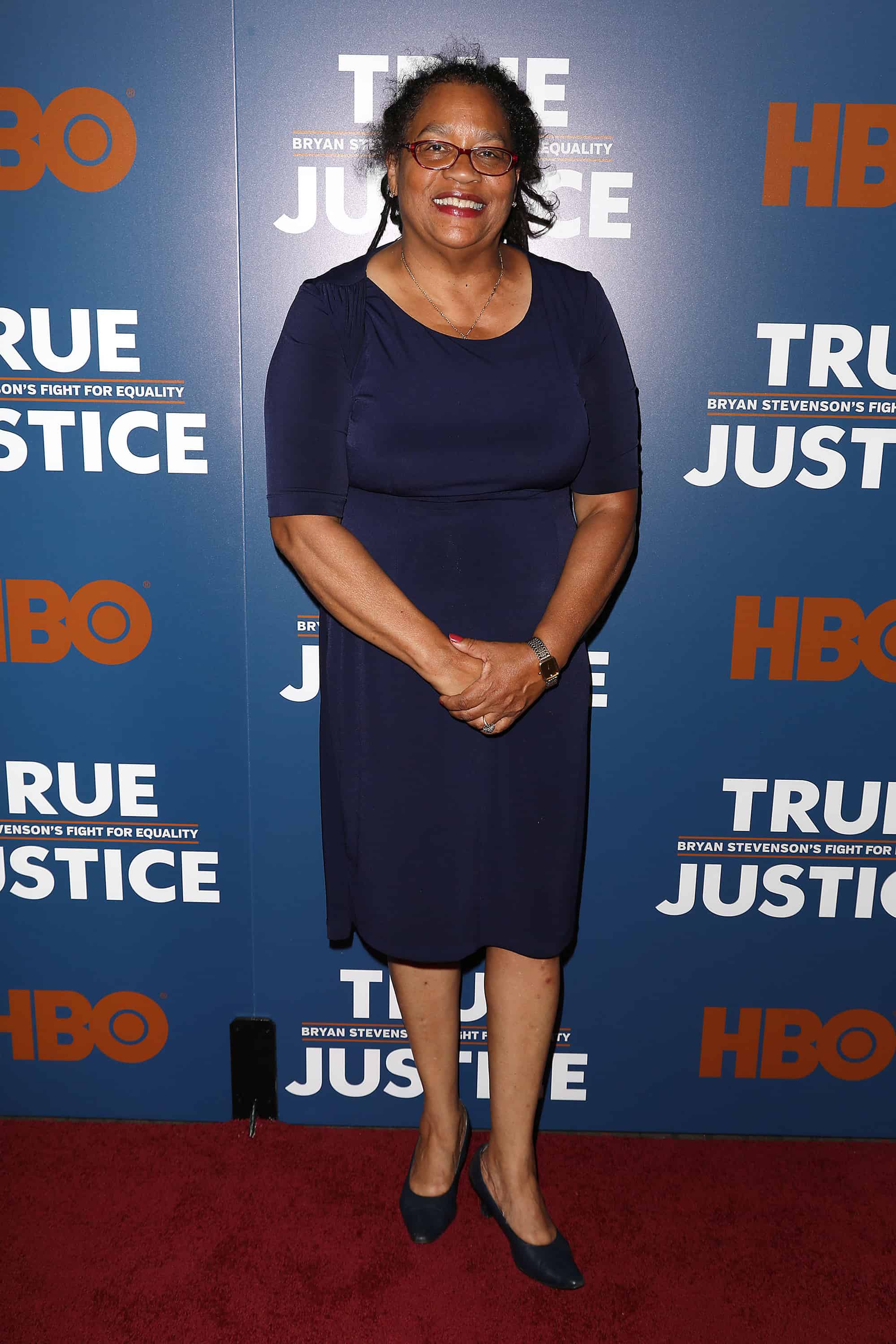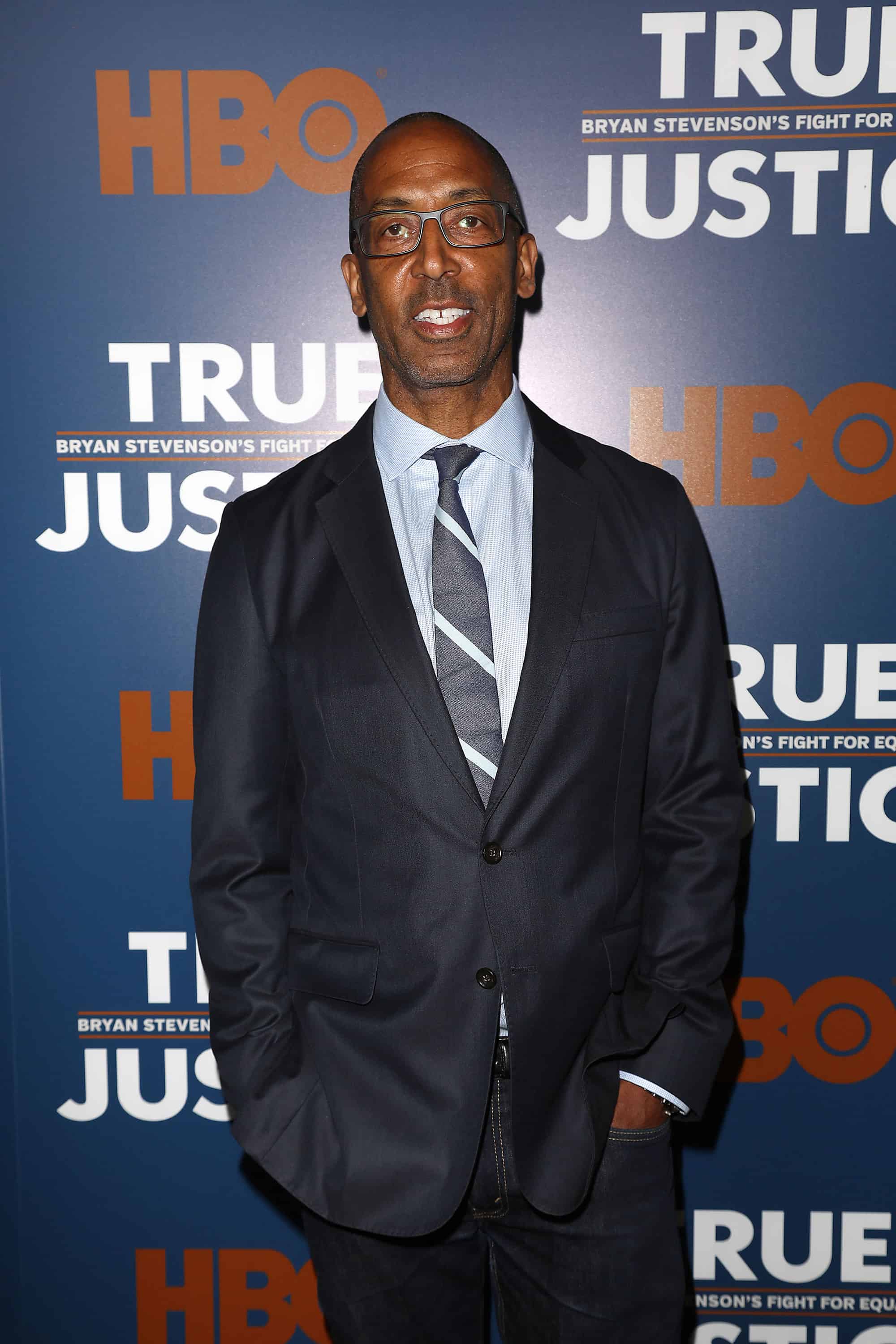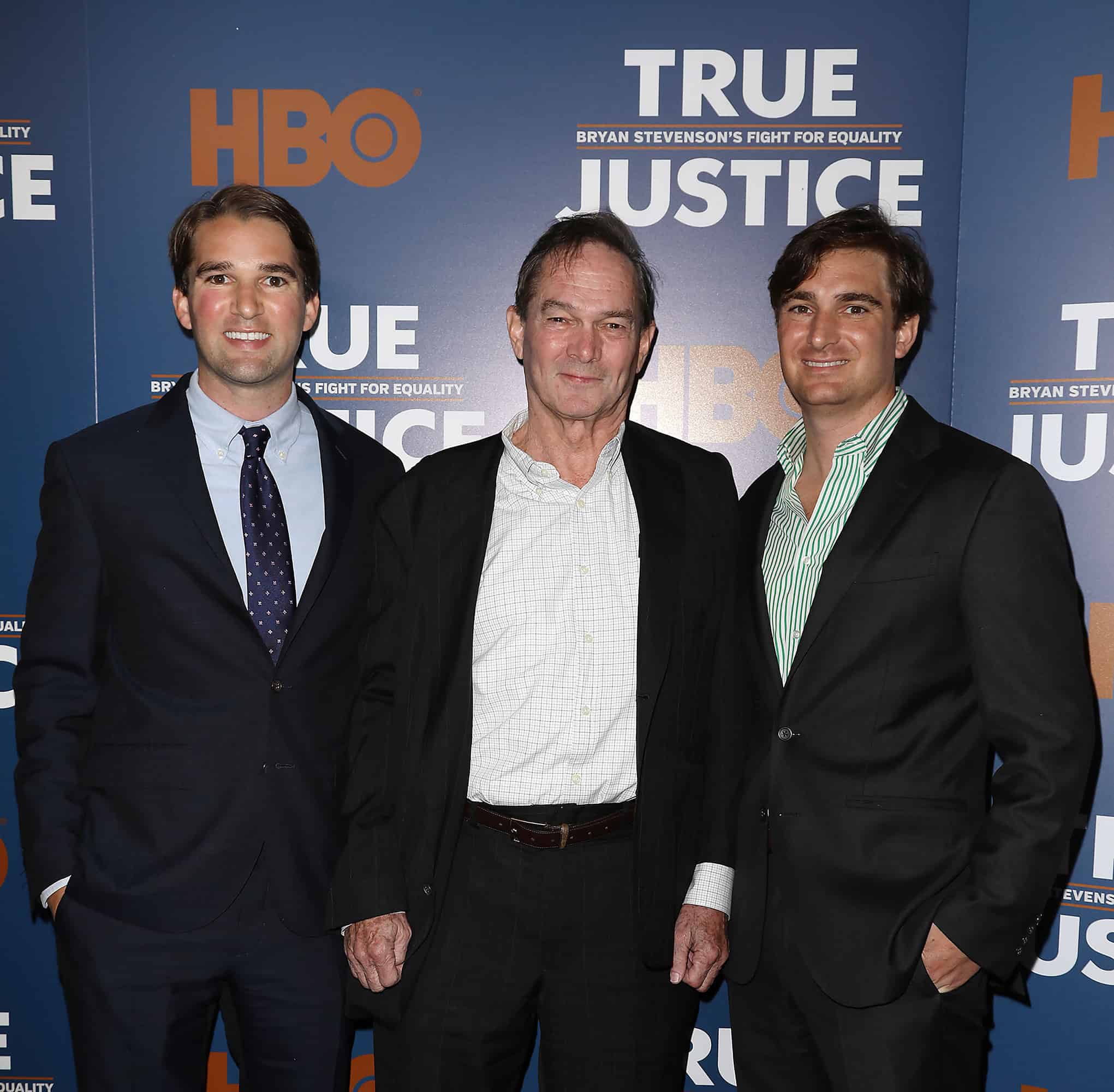We caught up with feminist icon Gloria Steinem, film subjects, and members of the “True Justice: Bryan Stevenson’s Fight for Equality” production team on the red carpet at a special screening of the film at the SVA Theater.
The film, a production of Kunhardt Films which specializes in documentary films about historical figures, follows Bryan Stevenson’s life and career. Stevenson is a lawyer and activist who founded the Equal Justice Initiative (EJI), an organization committed to ending mass incarceration and excessive punishment in the US.
According to EJI’s website, the film is currently out on HBO and is available for free without a subscription for 30 days starting today. In six months, all restrictions on access to the film will be lifted. EJI hopes to make the film widely available to all audiences.
Read below for transcripts of our conversations with film subjects Anthony Ray Hinton and Christy Taylor, executive producer Trey Ellis, directors and producers Peter, George, and Teddy Kunhardt, and special guest Gloria Steinem!

Bryan Stevenson (left) and Anthony Ray Hinton (right) – Courtesy of HBO Documentary Films
Anthony Ray Hinton (exonerated from Alabama’s death row after 28 years, represented by Bryan Stevenson)
The Knockturnal: Can you tell me a little about how you got involved in this movie. I know Mr. Stevenson was being approached for it so were you approached for it alongside him?
Anthony Ray Hinton: Oh yes Mr. Stevenson asked me to take a part in it and I was more than honored to take a part in it, to tell people about what happened to me. as you probably know, I spent 30 years on Alabama’s death row for a crime that I didn’t commit, 30 years where they knew that I was innocent. sometimes it takes tragedy for us to realize that we have what I would call a broken system, but it also is a system that is designed to do exactly what it is doing, and that is to put innocent men and women in prison. when I was asked to take part in it and share my story, I was more than happy to do so.
The Knockturnal: A lot of the conversation tonight is about confronting history and not even about fixing things or repairing the system. Do you think we’ve made any progress in possibly confronting our history since, say the 60s?
Anthony Ray Hinton: Absolutely. You know, I am often asked when I go across this country, “Have we made any progress? Have we made any progress in the south?” And the answer would have to be yes because at one time in the state of Alabama, people of color could not vote. People of color could not go in restaurants. People of color could not ride in the front of the bus, and there was a whole lot of other things that people of color could not do. But through progress, we now can vote, we now can own the restaurant, we now can sit in the front of the bus. You can even own the bus. To me, that is progress. Would I stand here and tell you we have made great strides? We have a long way to go, but we have to chip away at it every day, every second, we have to just chip away at it.
The Knockturnal: What do you think are the most important conversations that Congress needs to have?
Anthony Ray Hinton: I think the most important conversation that Congress needs to have is they need to sit down with people like myself and understand the problem. Be willing to listen. And be willing and open-minded to do what they need to do and what people want them to do, and that is to solve problems. You can’t tell me when I came home in 2015 and I was the 152nd person who had been exonerated from death row – that is a problem. Congress needs to know these statistics and need to ask what do you think we can do to solve these problems? What can we do to not send innocent men and women to prison? And what can we do to keep them from sending juveniles to a death sentence? All of this plays into their job and I think they just need to sit down with people who want a judicial system that is fair for everyone. That’s one of the ways is just to sit down with people who have been incarcerated and talk to them and let them give them a sense of what it’s like.
The Knockturnal: What do you think are the most important conversations that we need to be having as audience members of this film?
Anthony Ray Hinton: I think you need to look at what it says, whether you’re for the death penalty or not, but be willing to change your mind. Be willing to let this film convict who you are. Let this film resonate into you what we’re trying to do. And there’s the history, and we’re trying to show that this is a history we have often ignored, but it’s there. And we have to do something about it.

Christy Taylor – Courtesy of HBO Documentary Films
Christy Taylor (Bryan Stevenson’s sister)
The Knockturnal: You’ve been involved with this film as a subject, but of course you’ve also lived the events. As that translated onto screen, was there anything that you learned that you didn’t realize before?
Christy Taylor: It was surprising how even with my family, my grandmother, they found in their research – well I don’t want to give it away but certainly at the end of the film, it was really interesting to learn the history of our family that Bryan had been involved in with interviewing our grandmother. There were some things I didn’t know and it was really good to hear and to see pictures I hadn’t seen in a while of my mother and my grandmother so I was really pleased that that was part of the story.
The Knockturnal: Are you involved with any of Bryan’s work?
Christy Taylor: Right now we’re actually in Delaware. We’re starting a public charter school in his name. He doesn’t have anything directly involved in it, but it inspired us to do something in Sussex county and we’re in the works. Three years, we’re hoping to have a high school that has some of the concepts in the curriculum of aviation. We have agriculture, we have medicine, and law – those are some of the key components of our really challenging curriculum for high school students in Delaware. We’re partnering with a university that’s going to help with those outcomes.
The Knockturnal: You’ve seen a lot through the course of this documentary and of your brother’s work. I think it can be very difficult to remain hopeful about the future.
Christy Taylor: It’s tricky, because just with what’s happening on a day-to-day basis, I think it’s interesting that it’s been illuminated more nationwide in the past two weeks than ever. There’s a connection of impoverishment and justice and the lack of diversity in the upper courts that’s the challenge. We’ve just been really blind to humanity when it comes to how to treat people. It’s really shocking actually. But I’m hoping that everyone can take a look and be sober about how we can affect things by getting involved and staying active and really being positive and staying hopeful by doing some uncomfortable things like gathering people together and saying we like this or we don’t like that. Can we move the needle forward? Just yesterday – now it’s like national news because there was a lynching of George White in 1903, was so horrific and it’s obscure – and there was a young person that wanted to make legislation and a marker for it. People are doing things that allow us to have some enlightenment, and that’s part of peace. That’s part of the love quotient. There’s no point in being emotional and reactionary about things we can’t change aside from trying to eliminate the facts of our history and to be activists.

Trey Ellis – Courtesy of HBO Documentary Films
Trey Ellis (executive producer)
The Knockturnal: I just heard you say it took some time to convince Mr. Stevenson and the EJI to agree to this film. What do you think eventually changed their minds?
Trey Ellis: We had to prove our intentions were true. There are people who have suffered and it’s sensitive work, and we had to show that we were respectful of that. And I think we finally did it.
The Knockturnal: Who’s idea was this originally? How did you get involved?
Trey Ellis: I guess Peter Kunhardt and his sons – they’ve known about Bryan Stevenson – their other brother had him speak at a gala. We all heard him. He’s one of the most electrifying speakers in the world – you go “wow.” The more you read about him, not only is he a public figure, but he’s an amazing attorney and he just started to work on the memorial. The stars aligned and we said “this is his time.”
The Knockturnal: What are you hoping audiences will take away from this film?
Trey Ellis: I hope that they become active. I hope they really want to do the work. It’s easy to say “Oh, the problems are intractable,” but I think he proves that there’s a hope in the selfless staff of his at EJI that we can all contribute to.
The Knockturnal: What are your hopes from this film and for the future of social justice in general?
Trey Ellis: I think it’s to, as he says in the film, to change the narrative about the history from slavery to mass incarceration, to understand the gravity of slavery that we’re still living in these issues to this day, all of that. The museum and his work is a beginning, but I think he’s giving us a frame by which we can understand better where we’ve come from and to see where we’re gonna go.

George Kunhardt (left), Peter Kunhardt (middle), Teddy Kunhardt (right) – Courtesy of HBO Documentary Films
Peter, George, and Teddy Kunhardt (directors and producers)
The Knockturnal: Congratulations on the film! Can you tell me a little about the inception of this film?
George Kunhardt: There’s two parts to the inception. First we heard Bryan speak at his TED Talk in 2012, which moved us to tears. But our brother’s the executive director of the Gordon Parks Foundation who honored Bryan in 2016. When we heard him, we had the longest standing ovation we’ve ever heard, knew that we wanted to do a film on Bryan and spend a while trying to ask him to do a film and the rest is history. It’s been the best project of our lives.
Peter Kunhardt: He’s an inspiration and the more we can help spread his word, the better.
The Knockturnal: How did you end up convincing Mr. Stevenson and his initiative to do the film?
Teddy Kunhardt: That was one of the hardest parts. He’s a very private man and very protective of all of his cases. He watched our film that debuted last year, “King in the Wilderness,” and saw the care that we took and he had also received the Gordon Parks award, so he’s known our family for a while and knew the history of our films.
George Kunhardt: The biggest thing is trust, and we gained Bryan’s trust and once that happened, more and more interviews happened, more time spent with Bryan. The film was only better with more trust on his side. What we bring as a family company is an amazing amount of trust, which works very well.
The Knockturnal: What has been the most eye-opening thing that you’ve learned in the making of this film?
Teddy Kunhardt: The biggest thing is that the North won the Civil War, the South won the narrative war, and slavery didn’t end with the Civil War, it just evolved.
George Kunhardt: It’s an amazing film that we hope everyone watches because it’s a film that people need to see and people need to understand the message and hear it. Especially from Bryan.
Gloria Steinem
The Knockturnal: It’s an honor to meet you! Can you tell me what brings you to this premiere?
Gloria Steinem: The work that Bryan Stevenson does is so, so important. It’s always been important, but I think right now when we’re understanding mass incarceration, the injustice of people who are there just because they can’t make bail, who’s up for capital punishment, who’s not – we just had another big dose of understanding this because of the movie about the Central Park five. What’s important about this is it’s not just saying how bad it is, but that Bryan can tell us how to make it better.
The Knockturnal: That’s always the most powerful thing. It’s very easy to feel things are very bleak, to lose hope.
Gloria Steinem: That’s what’s so important about his work. He has a gift for two things: telling you how bad it is – he calls capital punishment “indoor lynching” – you don’t forget that. And giving you hope and a way to make it better.
The Knockturnal: Can you tell me about what you’re focusing on right now? What kinds of issues you think are most important? Other than why we’re here of course!
Gloria Steinem: It’s hard because there are so many. But we just defeated in New York state, an effort to commercialize surrogacy. The kinds of arrangements that people personally and ethically make in terms of surrogate births should not be commercialized. We shouldn’t allow Wall Street into women’s wombs. There was a very dangerous bill that we’ve just defeated.
The Knockturnal: Congratulations. You’ve had obviously an incredible career in fighting for women’s rights through a lot of tumultuous times and even still today. What kinds of progress in those rights have you been surprised by?
Gloria Steinem: The big surprise now is that what used to be a concern of social justice movements, and only about a third of the population, are now majority concerns in all the public opinion polls. That’s a huge victory. What it means is that we have a backlash from the third of the people who still believe in the old hierarchies and feel deprived of the power they got from race or from sex or from whatever. So it’s dangerous because that third of the country is responsible for putting Trump in the White House.
The Knockturnal: At least a third!
Gloria Steinem: Of course he was not popularly elected at all, but because of the peculiarity of our voting system, he’s in the White House. So it’s hopeful, much more hopeful than in my memory. The role of older people is to bring hope because we remember when it was worse *chuckles* and a very important role of younger people is to be mad as hell.
